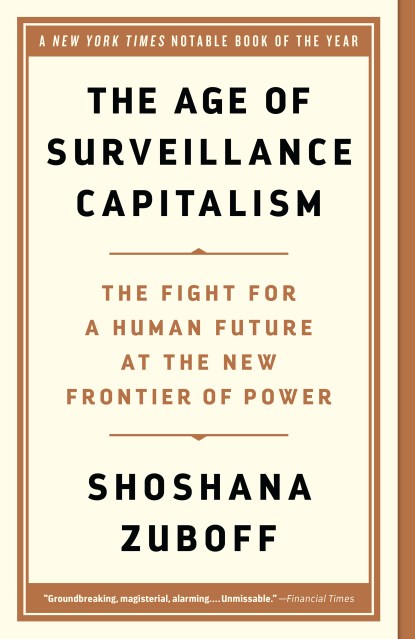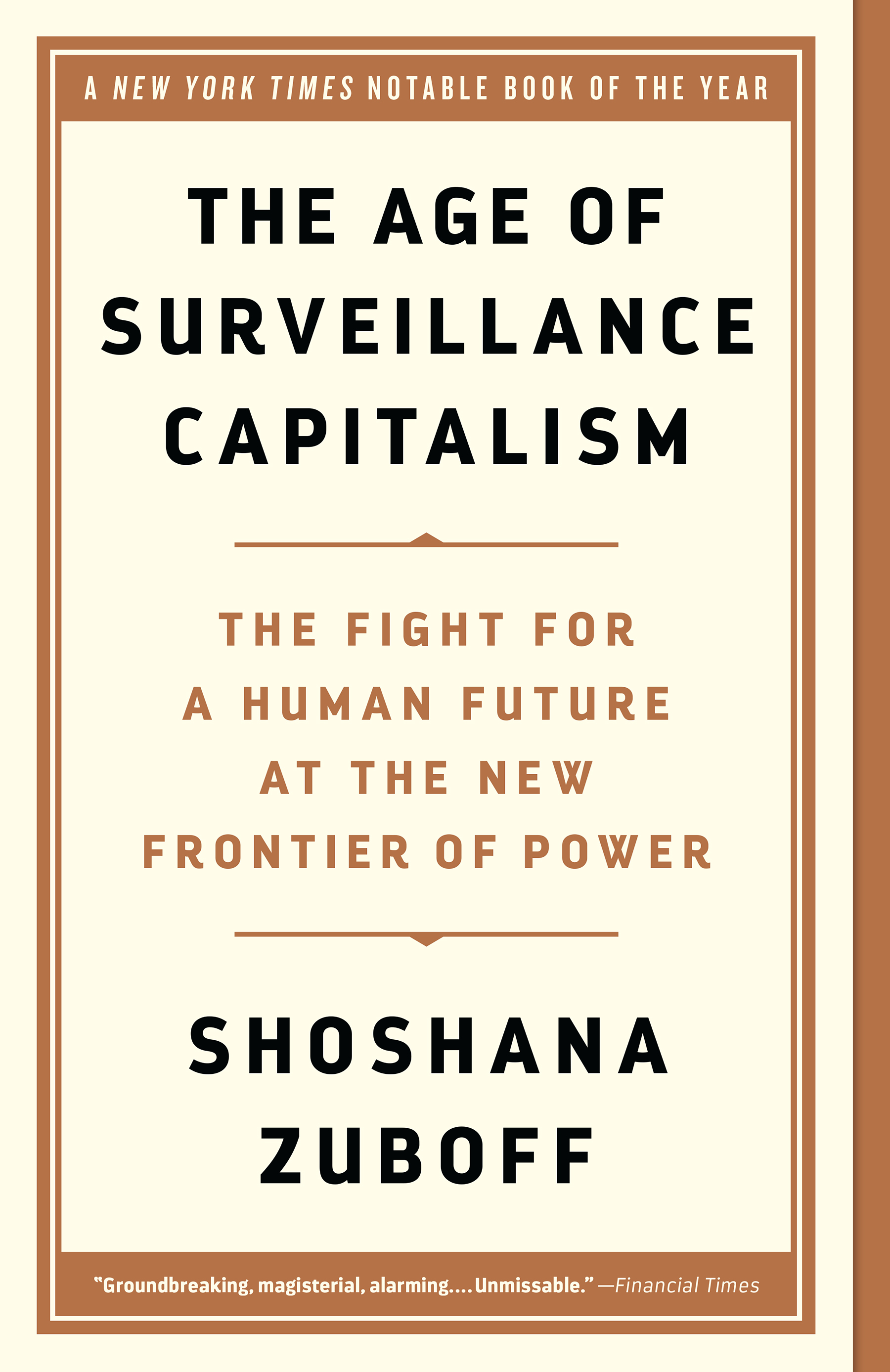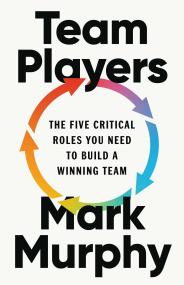Promotion
Use code BEST25 for 25% off storewide. Make sure to order by 11:59am, 12/12 for holiday delivery!
By clicking “Accept,” you agree to the use of cookies and similar technologies on your device as set forth in our Cookie Policy and our Privacy Policy. Please note that certain cookies are essential for this website to function properly and do not require user consent to be deployed.
The Age of Surveillance Capitalism
The Fight for a Human Future at the New Frontier of Power
Contributors
Formats and Prices
- On Sale
- Mar 3, 2020
- Page Count
- 704 pages
- Publisher
- PublicAffairs
- ISBN-13
- 9781541758001
Price
$24.99Price
$32.99 CADFormat
Format:
- Trade Paperback $24.99 $32.99 CAD
- ebook $16.99 $21.99 CAD
- Hardcover $42.00 $54.00 CAD
- Audiobook Download (Unabridged)
This item is a preorder. Your payment method will be charged immediately, and the product is expected to ship on or around March 3, 2020. This date is subject to change due to shipping delays beyond our control.
Buy from Other Retailers:
The heady optimism of the Internet’s early days has turned dark. Surveillance capitalism has deepened inequality, sown societal chaos, and undermined democracy.
The fight for a human future has never been more urgent. Shoshana Zuboff argues that we still have the power to decide what kind of world we want to live in: Will we allow surveillance capitalism to wrap us in its iron cage as it enriches the few and subjugates the many? Or will we demand the rights and laws that place this rogue power under the democratic rule of law? Only democracy can ensure that the vast new capabilities of the digital era are harnessed to the advancement of humanity. The Age of Surveillance Capitalism is a deeply original, exquisitely reasoned, and spell binding examination of our emerging information civilization and the life and death choices we face.
-
An International Bestseller
A New York Times Notable Book of the Year
A Financial Times Best Book of the Year
A Sunday Times (UK) Best Business Book of the Year
Selected by Barack Obama, Zadie Smith (in the Wall Street Journal), Jia Tolentino (in the
New Yorker), Elif Shafak (in the Guardian), and Ana Botin (in Bloomberg) as one of the
best books of 2019
Finalist for the Financial Times/McKinsey Best Book of the Year Award -
“If a book’s importance is gauged by how effectively it describes the world we’re in, and how much potential it has to change said world, then in my view it’s easily the most important book to be published this century... Zuboff is concerned with the largest act of capitalist colonisation ever attempted, but the colonisation is of our minds, our behaviour, our free will, our very selves. Yet it’s not an anti‑tech book. It’s anti unregulated capitalism, red in tooth and claw. It’s really this generation’s Das Kapital.”Zadie Smith
-
“Extraordinarily intelligent... Absorbing Zuboff’s methodical determination, the way she pieces together sundry examples into this comprehensive work of scholarship and synthesis, requires patience, but the rewards are considerable ‑ a heightened sense of awareness, and a deeper appreciation of what’s at stake. A business model that seeks growth by cataloging our ‘every move, emotion, utterance and desire’ is too radical to be taken for granted. As Zuboff repeatedly says near the end of the book, ‘It is not O.K.’”Jennifer Szalai, New York Times
-
“The rare volume that puts a name on a problem just as it becomes critical... This book’s major contribution is to give a name to what’s happening, to put it in cultural and historical perspective, and to ask us to pause long enough to think about the future and how it might be different from today.”Frank Rose, Wall Street Journal
-
“Many adjectives could be used to describe Shoshana Zuboff’s latest book: groundbreaking, magisterial, alarming, alarmist, preposterous. One will do: unmissable... As we grope around in the darkness trying to grasp the contours of our digital era, The Age of Surveillance Capitalism shines a searing light on how this latest revolution is transforming our economy, politics, society ‑ and lives.”John Thornhill, Financial Times
-
“One of the most important criticisms of the power of Big Tech.”Rana Foroohar, Financial Times
-
“The most ambitious attempt yet to paint the bigger picture and to explain how the effects of digitisation that we are now experiencing as individuals and citizens have come about... A continuation of a tradition that includes Adam Smith, Max Weber, Karl Polanyi and‑dare I say it‑Karl Marx... A striking and illuminating book.”The Observer
-
“Shoshana Zuboff’s The Age of Surveillance Capitalism is already drawing comparisons to seminal socioeconomic investigations like Rachel Carson’s Silent Spring and Karl Marx’s Capital. Zuboff’s book deserves these comparisons and more: Like the former, it’s an alarming exposé about how business interests have poisoned our world, and like the latter, it provides a framework to understand and combat that poison. But The Age of Surveillance Capitalism, named for the now‑popular term Zuboff herself coined five years ago, is also a masterwork of horror. It’s hard to recall a book that left me as haunted as Zuboff’s, with its descriptions of the gothic algorithmic daemons that follow us at nearly every instant of every hour of every day to suck us dry of metadata. Even those who’ve made an effort to track the technology that tracks us over the last decade or so will be chilled to their core by Zuboff, unable to look at their surroundings the same way.”Sam Biddle, The Intercept
-
“A definitive, stunning analysis of how digital giants like Google, Facebook, etc. have single‑mindedly pursued data on human behavior as fodder for generating predictions and shaping outcomes salable to advertisers and others...The scope of her analysis is extraordinary; in addition to covering philosophical, social, and political implications she discusses needed privacy regulation...This book is pathbreaking, illuminating, and unnerving.”Choice
-
“Chilling and essential.”Globe And Mail
-
“A book that no tech industry official will want the American public to read... One of the true joys of this insanely brilliant, deeply unsettling book is how fluidly Ms. Zuboff’s style incorporates jargon, analogy, research and memoir.”Pittsburgh Post Gazette
-
“Eye‑opening...she raises questions about businesses that mine personal data, manipulate our desires for instantaneous information, and encourage us to narcissistically display our egos and foibles on social media platforms.”San Antonio Express News
-
“Staggeringly brilliant.”Winnipeg Free Press
-
“A warning bell, sounded clearly for both the people in danger and of those with the power to do something to keep them safe... a truly sobering shock to the system, a call for ordinary people to re‑assert control before it’s too late.”The National (UAE)
-
“An original and often brilliant work, and it arrives at a crucial moment, when the public and its elected representatives are at last grappling with the extraordinary power of digital media and the companies that control it. Like another recent masterwork of economic analysis, Thomas Piketty’s 2013 Capital in the Twenty‑First Century, the book challenges assumptions, raises uncomfortable questions about the present and future, and stakes out ground for a necessary and overdue debate. Shoshana Zuboff has aimed an unsparing light onto the shadowy new landscape of our lives. The picture is not pretty.”Nicholas Carr, Los Angeles Review of Books
-
“An intensively researched, engagingly written chronicle of surveillance capitalism’s origins and its deleterious prospects for our society... [Zuboff’s] after something bigger, providing a scaffolding of critical thinking from which to examine the great crises of the digital age... This is the rare book that we should trust to lead us down the long hard road of understanding.”Jacob Silverman, New York Times Book Review
-
“From the very first page I was consumed with an overwhelming imperative: everyone needs to read this book as an act of digital self‑defense. With tremendous lucidity and moral courage, Zuboff demonstrates not only how our minds are being mined for data but also how they are being rapidly and radically changed in the process. The hour is late and much has been lost already‑but as we learn in these indispensable pages, there is still hope for emancipation.”Naomi Klein, author of This Changes Everything
-
“The Age of Surveillance Capitalism is brilliant and essential. Shoshana Zuboff reveals capitalism’s most dangerous frontier with stunning clarity: The new economic order of surveillance capitalism founded on extreme inequalities of knowledge and power. Her sweeping analysis demonstrates the unprecedented challenges to human autonomy, social solidarity, and democracy perpetrated by this rogue capitalism. Zuboff’s book finally empowers us to understand and fight these threats effectively‑‑a masterpiece of rare conceptual daring, beautifully written and deeply urgent.”Robert B. Reich, author of Saving Capitalism
-
“Zuboff’s expansive, erudite, deeply‑researched exploration of digital futures elucidates the norms and hidden terminal goals of information‑intensive industries. Zuboff’s book is the information industry’s Silent Spring."Chris Hoofnagle, University of California, Berkeley
-
“My mind is blown on every page by the depth of Shoshana’s research, the breadth of her knowledge, the rigor of her intellect, and finally by the power of her arguments. I’m not sure we can end the age of surveillance capitalism without her help, and that’s why I believe this is the most important book of our time.”Doc Searls, editor in chief, Linux Journal
-
“In the future, if people still read books, they will view this as the classic study of how everything changed. The Age of Surveillance Capitalism is a masterpiece that stunningly reveals the essence of twenty‑first‑century society, and offers a dire warning about technology gone awry that we ignore at our peril. Shoshana Zuboff has somehow escaped from the fishbowl in which we all now live, and introduced to us the concept of water. A work of penetrating intellect, this is also a deeply human book about what is becoming, as it relentlessly demonstrates, a dangerously inhuman time.”Kevin Werbach, The Wharton School, University of Pennsylvania
-
“A panoramic exploration of one of the most urgent issues of our times, Zuboff reinterprets contemporary capitalism through the prism of the digital revolution, producing a book of immense ambition and erudition. Zuboff is one of our most prescient and profound thinkers on the rise of the digital. In an age of inane Twitter soundbites and narcissistic Facebook posts, Zuboff’s serious scholarship is great cause for celebration.”Andrew Keen, author of How to Fix the Future
-
“Zuboff is a strikingly original voice, simultaneously bold and wise, eloquent and passionate, learned and accessible. Read this book to understand the inner workings of today’s digital capitalism, its threats to twenty‑first century society, and the reforms we must make for a better tomorrow.”Frank Pasquale, University of Maryland Carey School of Law
-
“Shoshana Zuboff has produced the most provocative compelling moral framework thus far for understanding the new realities of our digital environment and its anti‑democratic threats. From now on, all serious writings on the internet and society will have to take into account with The Age of Surveillance Capitalism.”Joseph Turow, Annenberg School, University of Pennsylvania
-
“The defining challenge for the future of the market economy is the concentration of data, knowledge, and surveillance power. Not just our privacy but our individuality is at stake, and this very readable and thought‑provoking book alerts us to these existential dangers. Highly recommended.”Daron Acemoglu, co-author of Why Nations Fail
-
“I will make a guarantee: Assuming we survive to tell the tale, The Age of Surveillance Capitalism has a high probability of joining the likes Adam Smith’s The Wealth of Nations and Max Weber’s Economy and Society as defining social‑economics texts of modern times. It is not a ‘quick read;’ it is to be savored and re‑read and discussed with colleagues and friends. No zippy one‑liners from me, except to almost literally beg you to read/ingest this book.”Tom Peters, co-author of In Search of Excellence
Newsletter Signup
By clicking ‘Sign Up,’ I acknowledge that I have read and agree to Hachette Book Group’s Privacy Policy and Terms of Use







